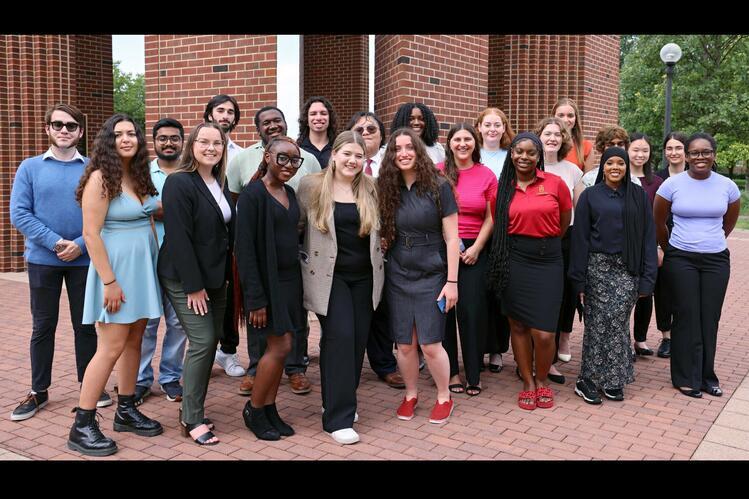Where technology, agriculture and young minds meet

This summer, the Center for Digital Agriculture (CDA) hosted the largest cohort of students yet in the four-year history of the CDA Research Experiences for Undergraduates (REU) program. In 2023, seven students interned in the 10-week program. This year, that number has tripled to 22 students.
“We want to give students opportunities for research that they may not get in their home institutions,” said Christina Tucker, the CDA REU program coordinator. “We want to bring engineering and computer science students to campus and NCSA to introduce them to agricultural applications and a future career path. We also want to do the same for agricultural students and show them that they have a place and a voice in the digital agriculture space. Students from these groups need to be part of the conversation for us to solve these important problems.”
The CDA REU program pairs students with mentors to work on research projects in digital agriculture. One of the program’s core principles is workforce development, focusing on recruiting students from non-Ph.D.-granting institutions and from underrecognized populations, including groups from minority-serving institutions (MSI), community colleges and women in STEM. Tucker notes the program inspires students to consider digital agriculture as a career path and to pursue graduate school or other industry opportunities.
“This is our largest class, with many computer science and domain students. We plan to keep growing the program,” Tucker said. “If you look at the number of applications from the first three years, the program has become more and more competitive.”
The program has caught the attention of students from across the country. This year, 115 students applied. Tucker says the goal is to increase the number of students accepted into the program to 30 to 40 students in the future, giving more students chances to learn about digital agriculture and get real-world research experience.
Students drive the CDA REU program, and what they get from it demonstrates the strength of its reach. In addition to working on research projects, students also take part in the AI Foundry for Ag Application Short Course and Hackathon, a certificate-earning, graduate-level boot camp on AI.
Check out this summer’s CDA REU student profiles and their mentor profiles.
The CDA REU program is supported by NSF proposal #2244580 REU Site: Drivers for Machine Learning and Artificial Intelligence Practices (MAPs), the Center for Digital Agriculture, Artificial Intelligence for Future Agricultural Resilience, Management, and Sustainability (AIFARMS), and Center for Research on Programmable Plant Systems (CROPPS).
About the Center for Digitial Agriculture
The Center for Digital Agriculture (CDA) draws on Illinois’ historic land-grant pillars of agriculture and engineering to shape the future of the agriculture industry. The center brings together researchers, educators, industry and agricultural producers to transform how we feed and support a growing global population through innovative approaches. CDA also boasts a Master’s of Engineering in Digital Agriculture and six certificate programs that address the profound workforce shortage in this field by providing graduates and working professionals with in-depth knowledge and technical skills. CDA is a multidisciplinary effort at the University of Illinois Urbana-Champaign between the Grainger College of Engineering, the College of Agricultural, Consumer and Environmental Sciences, and the National Center for Supercomputing Applications. CDA also leads the Artificial Intelligence for Future Agricultural Resilience, Management, and Sustainability (AIFARMS) Institute which is supported by the USDA National Institute of Food and Agriculture and the National Science Foundation. CDA also leads the U. of I. sub-award for the Center for Research on Programmable Plant Systems (CROPPS), which is supported by the National Science Foundation.